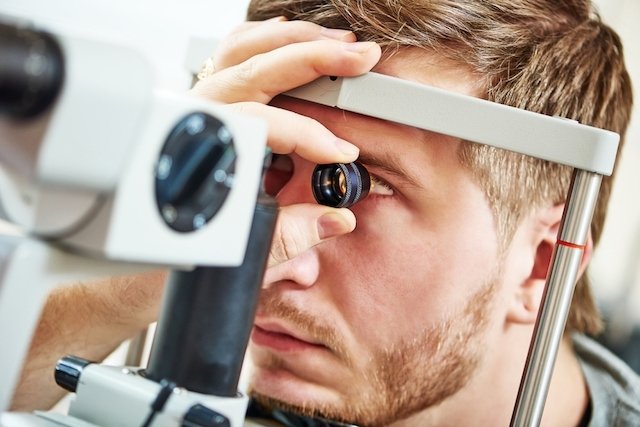Blurry vision is a relatively common symptom in people who already have a vision problem, like myopia or hypermetropia. In these cases, it is generally advised to correct vision with prescription lenses as guided by an ophthalmologist.
If blurry vision appears suddenly, however, it may be a sign of another health condition, like conjunctivitis, cataracts or diabetes.
If you experience blurry vision suddenly that does not improve within a few minutes, or if is accompanied by other symptoms like burning in the eyes, tearing

Causes of blurry vision
The most common causes of blurry vision include:
1. Myopia or hypermetropia
Myopia or hypermetropia are two of the most common vision problems. Myopia is characterized by the inability to see clearly at a distance, while hypermetropia is the inability to see clearly up close. These vision issues can cause blurry vision is left uncorrected, and may lead to other symptoms like constant headache, easy fatigue and the need to squint frequently.
What to do: You should consult an ophthalmologist to complete vision testing to ensure what the underlying vision problem is. From there, treatment can start with glasses, contact lenses or even surgery.
2. Presbyopia
Presbyopia is another frequent vision problem that is particularly seen in people over the age of 40. It is characterized by the difficulty to focus on object or texts up-close. Normally, people with this vision issue need to hold books or magazines far away so that their eyes can focus clearly on the letters.
What to do: Presbyopia can be confirmed by an ophthalmologist and is usually corrected with prescription reading glasses.
3. Conjunctivitis
Another common condition that can cause blurry vision is conjunctivitis. This is an easily-transmitted eye infection that can be caused by a virus, bacteria or fungus. Other symptoms of conjunctivitis, also known as "pink-eye" include red eyes, itchiness, the sensation of sand in the eyes and crusting discharge.
What to do: It is important to identify the type of infection present to determine the need for an antibiotic ointment or eyedrops, like tobramycin or ciprofloxacin. You should consult an ophthalmologist to determine the best treatment.
4. Uncontrolled diabetes
Blurry vision may be a complication of poorly-managed diabetes. It is referred to retinopathy, which is a breakdown of the retina, blood vessels and nerves around the eye. This occurs when diabetes and blood sugar levels are not well-controlled.
What to do: If you have been diagnosed with diabetes, it is essential that you maintain a healthy diet without processed foods and sugar. You should take all medication as directed by your doctor. If you do not have diabetes, but suspect that you might (due to symptoms like frequent urination or excessive thirst), you should consult your doctor.
5. High blood pressure
Although it is less likely, high blood pressure can also cause blurry vision. High blood pressure can lead to a block in the blood vessels in the eyes, which can affect vision. Although it may not cause pain, many people may notice blurry vision when waking up, especially in just one eye.
What to do: If you suspect you have blurry vision due to high blood pressure, you should proceed immediately to the hospital or see a doctor urgently. Many times, this condition can be treated with aspirin or another blood-thinner.
6. Cataracts or glaucoma
Cataracts or glaucoma are vision problems that are related to age and emerge over time. These conditions are particularly seen in adults over the age of 50. Cataracts may be easier to identify, as they are associated with a white film over the eye. Glaucoma, however, is associated with other symptoms, like intense eye pain and vision loss.
What to do: If you suspect you may have a vision condition, you should see an ophthalmologist to confirm a diagnosis and start treatment as necessary. Treatment may include the use of specific eye-drops or surgery.
